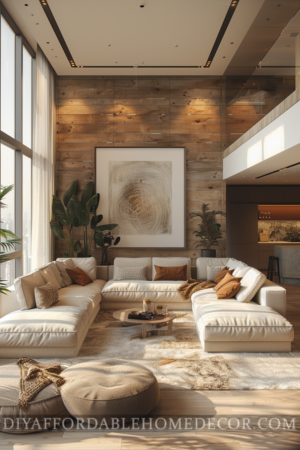 Whether you are a DIYer or you’re considering a career in interior design, you’ve come to the right place. Understanding the fundamentals of design elements can set you on a path to long-term success.
Whether you are a DIYer or you’re considering a career in interior design, you’ve come to the right place. Understanding the fundamentals of design elements can set you on a path to long-term success.
Setting the Room’s Purpose
Before diving into design, consider the room’s function. For instance, a child’s room should be vibrant and engaging to stimulate play, while a library should have a more subdued palette to promote tranquility.
Quick Tip
Always keep the room’s intended mood in mind when planning your design. Align your design choices with the mood you aim to create.
Choose the Room’s Mood
Decide on the atmosphere you want to establish before starting your design project. Whether you’re aiming for calmness or excitement, having a mood in mind will guide your overall design strategy.
Mastering Color Schemes
Selecting the right color scheme is crucial when redesigning any space. Be mindful of colors that harmonize and those that clash to ensure a balanced and tasteful look. Avoid overusing bold colors in a single space.
Quick Tip
When planning a room’s redesign, give extra consideration to the color scheme. Aim for a balanced and tasteful combination of colors.
Incorporating Textures and Patterns
Adding various textures and patterns can elevate your design. These elements can complement smooth surfaces like glass or wood, giving your home a modern, designer flair.
Attention to Detail
Small details can make a significant impact. By altering elements like cabinet knobs, curtains, or appliances, you can bring a room together in a cohesive manner.
Be Cautious with Paint Choices
Don’t rush to paint a room. Take your time to choose a color scheme that you’ll be happy with in the long run. Test multiple samples and observe them in different lighting conditions before making a decision.
Lighting Matters
Lighting plays a vital role in setting a room’s mood. Bright lighting is ideal for spaces like kitchens and bathrooms, while dimmer lights work well in bedrooms and living rooms to create a soothing atmosphere.
Quick Tip
Plan your budget before starting any design project. Knowing your financial limits will make the design process less stressful.
Trendy Accents
Incorporate modern accents to give your space a quick update. However, use them sparingly as accents rather than permanent fixtures.
Get Creative with Paint
Don’t hesitate to be inventive when painting rooms. Numerous online resources can inspire you to design a room that transitions from dull to dazzling.
Furniture Arrangement
You don’t have to align all the furniture in one direction. Creating a conversational setting with chairs can be a unique way to utilize space.
Quick Tip
Even minor elements can make a big difference. Small decorative items or color patterns can create an intriguing look.
Ceiling Paint
Consider using a specialized “ceiling white” paint to make your ceiling appear higher and reflect more light into the room.